| Hexapentakis truncated icosahedron | |
|---|---|
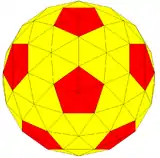 | |
| Conway notation | ktI |
| Geodesic polyhedron | {3,5+}3,0 |
| Faces | 180 |
| Edges | 270 |
| Vertices | 92 |
| Face configuration | (60) V5.6.6 (120) V6.6.6 |
| Symmetry group | Icosahedral (Ih) |
| Dual polyhedron | Truncated pentakis dodecahedron |
| Properties | convex |
The hexapentakis truncated icosahedron is a convex polyhedron constructed as an augmented truncated icosahedron. It is geodesic polyhedron {3,5+}3,0, with pentavalent vertices separated by an edge-direct distance of 3 steps.
Construction
Geodesic polyhedra are constructed by subdividing faces of simpler polyhedra, and then projecting the new vertices onto the surface of a sphere. A geodesic polyhedron has straight edges and flat faces that approximate a sphere, but it can also be made as a spherical polyhedron (A tessellation on a sphere) with true geodesic curved edges on the surface of a sphere. and spherical triangle faces.
| Conway | u3I = (kt)I | (k5)k6tI | (k)tI | Spherical ktI |
|---|---|---|---|---|
| Image | 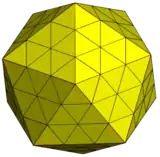 | 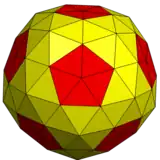 | 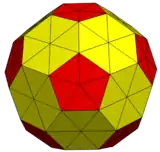 | 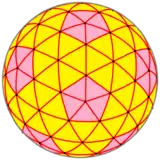 |
| Form | 3-frequency subdivided icosahedron | 1-frequency subdivided hexakis truncated icosahedron | 1-frequency subdivided truncated icosahedron | Spherical polyhedron |
Related polyhedra
| Polyhedron | Truncated Icosahedron | #Pentakis truncated Icosahedron | #Hexakis truncated Icosahedron | Hexapentakis truncated Icosahedron |
|---|---|---|---|---|
| Image |  |
 |
 |
 |
| Conway | tI | k5tI | k6tI | k5k6tI |
Pentakis truncated icosahedron
| Pentakis truncated icosahedron | |
|---|---|
 | |
| Conway notation | k5tI |
| Faces | 132: 60 triangles 20 hexagons |
| Edges | 90 |
| Vertices | 72 |
| Symmetry group | Icosahedral (Ih) |
| Dual polyhedron | Pentatruncated pentakis dodecahedron |
| Properties | convex |
The pentakis truncated icosahedron is a convex polyhedron constructed as an augmented truncated icosahedron, adding pyramids to the 12 pentagonal faces, creating 60 new triangular faces.
It is geometrically similar to the icosahedron where the 20 triangular faces are subdivided with a central hexagon, and 3 corner triangles.
Dual
Its dual polyhedron can be called a pentatruncated pentakis dodecahedron, a dodecahedron, with its vertices augmented by pentagonal pyramids, and then truncated the apex of those pyramids, or adding a pentagonal prism to each face of the dodecahedron. It is the net of a dodecahedral prism.
Hexakis truncated icosahedron
| Hexakis truncated icosahedron | |
|---|---|
 | |
| Conway notation | k6tI |
| Faces | 132: 120 triangles 12 pentagons |
| Edges | 210 |
| Vertices | 80 |
| Symmetry group | Icosahedral (Ih) |
| Dual polyhedron | Hexatruncated pentakis dodecahedron |
| Properties | convex |
The hexakis truncated icosahedron is a convex polyhedron constructed as an augmented truncated icosahedron, adding pyramids to the 20 hexagonal faces, creating 120 new triangular faces.
It is visually similar to the chiral snub dodecahedron which has 80 triangles and 12 pentagons.
Dual
The dual polyhedron can be seen as a hexatruncated pentakis dodecahedron, a dodecahedron with its faces augmented by pentagonal pyramids (a pentakis dodecahedron), and then its 6-valance vertices truncated.
It has similar groups of irregular pentagons as the pentagonal hexecontahedron.
See also
References
- Antony Pugh, Polyhedra: a visual approach, 1976, Chapter 6. The Geodesic Polyhedra of R. Buckminster Fuller and Related Polyhedra
- Wenninger, Magnus (1979), Spherical Models, Cambridge University Press, ISBN 978-0-521-29432-4, MR 0552023, archived from the original on July 4, 2008 Reprinted by Dover 1999 ISBN 978-0-486-40921-4
External links
- VTML polyhedral generator Try "ktI" (Conway polyhedron notation)

